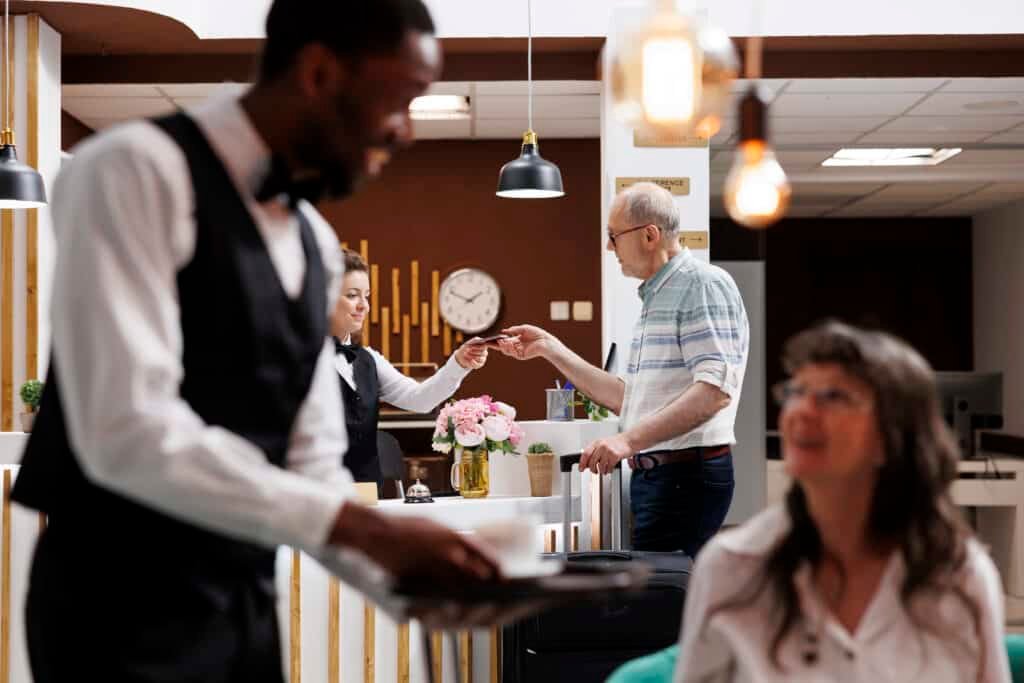
London’s got a hospitality scene that’s as vibrant as its double-decker buses and as unpredictable as the weather. In 2024, though, the sunshine’s been scarce for many pubs, restaurants, and hotels. Joshua Wood, CEO of Bloc, says, “rising costs, staffing shortages, and ever-evolving customer desires have created a market tougher than a Sunday roast after a night on craft beers.” But fear not, fellow foodies and adventurers! Let’s raise a glass (or grab a fork) to five London hospitality businesses who are not only surviving, but thriving, in this challenging environment.
Case Study 1: The Angel of Bow (East London Pub)
Stepping into The Angel of Bow is like stepping into a time capsule – one with exposed brick walls, worn wood floors, and a cast of regulars who could tell you tales of East London’s gritty past. Yet, this charmingly old-school pub isn’t stuck in the past. The Angel has embraced the digital age with a vengeance, utilizing targeted social media advertising to reach a new generation of East Londoners. Their Instagram is a delightful blend of pub grub close-ups (think perfectly golden fish and chips!), live music announcements, and hilarious dog-of-the-week features (seriously, who can resist a pub with a resident pup?). This savvy online presence has revitalized the pub, attracting a younger crowd without alienating the loyal old-timers who make The Angel their local. It’s a win-win, showcasing the power of targeted advertising to bridge generational gaps in the hospitality industry.
Case Study 2: The Nadler (Kensington Boutique Hotel)
In the luxury hotel market, space is often considered a selling point. The Nadler in Kensington, however, is defying this trend. Their rooms are compact, but cleverly designed for maximum comfort and efficiency. Each room boasts a sleek, minimalist aesthetic and cleverly utilizes smart technology to control lighting and temperature. This allows The Nadler to offer high-end style at a more accessible price point. They’ve also cleverly catered to the needs of the modern traveler by providing complimentary coworking spaces within the hotel – perfect for those who need to blend business and leisure. The Nadler’s success illustrates that luxury doesn’t have to mean square footage; it’s all about creating a stylish, functional, and tech-savvy space for the discerning guest who prioritizes experience over opulence.
Case Study 3: KERB (Street Food Market)
The street food scene in London is a kaleidoscope of flavors and cultures, but KERB has managed to rise above the fold. This innovative company has taken the concept of street food and elevated it, creating a series of curated markets showcasing the best independent food vendors in the city. From gourmet burgers to vegan delights to authentic Thai curries, KERB offers a diverse selection that caters to every palate. They’ve also become masters at creating a “buzz,” partnering with iconic landmarks like the Sky Garden and Regent’s Park for pop-up markets. This focus on experiential dining and fostering a sense of community has turned KERB into a London institution, proving that street food can be both delicious and sophisticated.
Case Study 4: Tattva in Farnborough (Indian Restaurant)
London’s love affair with Indian food is as enduring as the River Thames. But in a city boasting countless curry houses, how does one stand out? Tattva in Farnborough has the answer: hyper-local sourcing and a commitment to sustainability. Their menu is a symphony of fresh, seasonal ingredients sourced from farms within a 50-mile radius of the restaurant. This dedication to local produce ensures not only the freshest flavors but also a reduced carbon footprint – a major tick in the box for eco-conscious diners. Tattva doesn’t stop there. They’ve partnered with local charities, offering cooking workshops led by their chefs and donating a percentage of proceeds to support the community. This focus on sustainability and social responsibility has resonated with customers, turning Tattva into a local gem that’s not just about delicious food, but also about doing good.
Case Study 5: The Glory (Shoreditch Bar and Arcade)
In a city with a plethora of bars, The Glory in Shoreditch stands out by offering a unique experience that goes beyond just drinks. This vibrant venue is part bar, part arcade, and all-around good time. The bar boasts a selection of quirky cocktails and craft beers, while the impressive arcade features classic favourites like Pac-Man alongside modern indie games. The Glory also hosts regular live music nights, comedy shows, and themed events that cater to a diverse crowd. It’s the perfect spot for those seeking a night out that’s both nostalgic and exciting. The Glory’s success demonstrates the power of creating a multifaceted experience that goes beyond the expected.
Conclusion
In the cutthroat world of London’s hospitality industry, survival requires more than just great food or drinks. It demands creativity, adaptability, and a deep understanding of the changing needs and desires of consumers. The five case studies we’ve explored offer valuable insights into how businesses can thrive in this challenging market. From leveraging digital marketing to embracing sustainability, creating unique experiences, and catering to the needs of the modern traveler, these businesses have proven that there’s always room for innovation and success. So, the next time you’re enjoying a delicious meal, a perfectly poured pint, or a stylish hotel room in London, take a moment to appreciate the ingenuity and hard work that goes into making these experiences possible.
